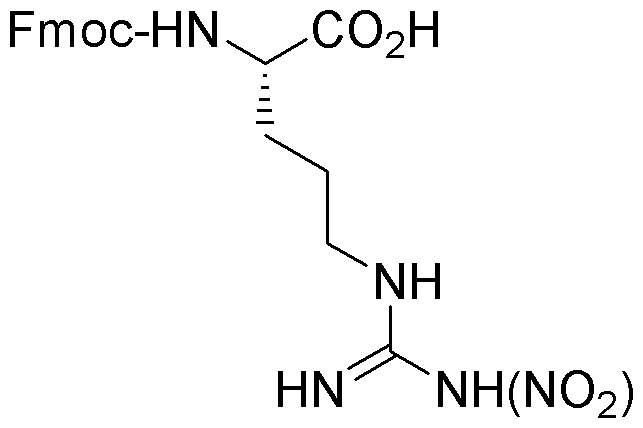Na-Fmoc-Nw-nitro-D-arginine is widely utilized in research focused on
- Peptide Synthesis: This compound serves as a key building block in the synthesis of peptides, particularly in the development of novel therapeutic agents. Its protective Fmoc group allows for selective deprotection during the synthesis process.
- Drug Development: Researchers leverage its unique nitro group to explore potential applications in drug design, particularly for targeting specific biological pathways in diseases such as cancer and cardiovascular disorders.
- Bioconjugation: The compound is valuable in bioconjugation techniques, where it can be used to attach biomolecules to surfaces or other compounds, enhancing the functionality of drugs and diagnostic agents.
- Research on Nitric Oxide Donors: Its structure allows for investigations into nitric oxide (NO) release, which is crucial for studies related to vascular biology and inflammation, providing insights into new therapeutic strategies.
- Analytical Chemistry: Na-Fmoc-Nw-nitro-D-arginine is also employed in analytical methods to study interactions between peptides and proteins, aiding in the understanding of biological processes and interactions.
General Information
Properties
Safety and Regulations
Applications
Na-Fmoc-Nw-nitro-D-arginine is widely utilized in research focused on
- Peptide Synthesis: This compound serves as a key building block in the synthesis of peptides, particularly in the development of novel therapeutic agents. Its protective Fmoc group allows for selective deprotection during the synthesis process.
- Drug Development: Researchers leverage its unique nitro group to explore potential applications in drug design, particularly for targeting specific biological pathways in diseases such as cancer and cardiovascular disorders.
- Bioconjugation: The compound is valuable in bioconjugation techniques, where it can be used to attach biomolecules to surfaces or other compounds, enhancing the functionality of drugs and diagnostic agents.
- Research on Nitric Oxide Donors: Its structure allows for investigations into nitric oxide (NO) release, which is crucial for studies related to vascular biology and inflammation, providing insights into new therapeutic strategies.
- Analytical Chemistry: Na-Fmoc-Nw-nitro-D-arginine is also employed in analytical methods to study interactions between peptides and proteins, aiding in the understanding of biological processes and interactions.
Documents
Safety Data Sheets (SDS)
The SDS provides comprehensive safety information on handling, storage, and disposal of the product.
Product Specification (PS)
The PS provides a comprehensive breakdown of the product’s properties, including chemical composition, physical state, purity, and storage requirements. It also details acceptable quality ranges and the product's intended applications.
Certificates of Analysis (COA)
Search for Certificates of Analysis (COA) by entering the products Lot Number. Lot and Batch Numbers can be found on a product’s label following the words ‘Lot’ or ‘Batch’.
*Catalog Number
*Lot Number
Certificates Of Origin (COO)
This COO confirms the country where the product was manufactured, and also details the materials and components used in it and whether it is derived from natural, synthetic, or other specific sources. This certificate may be required for customs, trade, and regulatory compliance.
*Catalog Number
*Lot Number
Safety Data Sheets (SDS)
The SDS provides comprehensive safety information on handling, storage, and disposal of the product.
DownloadProduct Specification (PS)
The PS provides a comprehensive breakdown of the product’s properties, including chemical composition, physical state, purity, and storage requirements. It also details acceptable quality ranges and the product's intended applications.
DownloadCertificates of Analysis (COA)
Search for Certificates of Analysis (COA) by entering the products Lot Number. Lot and Batch Numbers can be found on a product’s label following the words ‘Lot’ or ‘Batch’.
*Catalog Number
*Lot Number
Certificates Of Origin (COO)
This COO confirms the country where the product was manufactured, and also details the materials and components used in it and whether it is derived from natural, synthetic, or other specific sources. This certificate may be required for customs, trade, and regulatory compliance.


